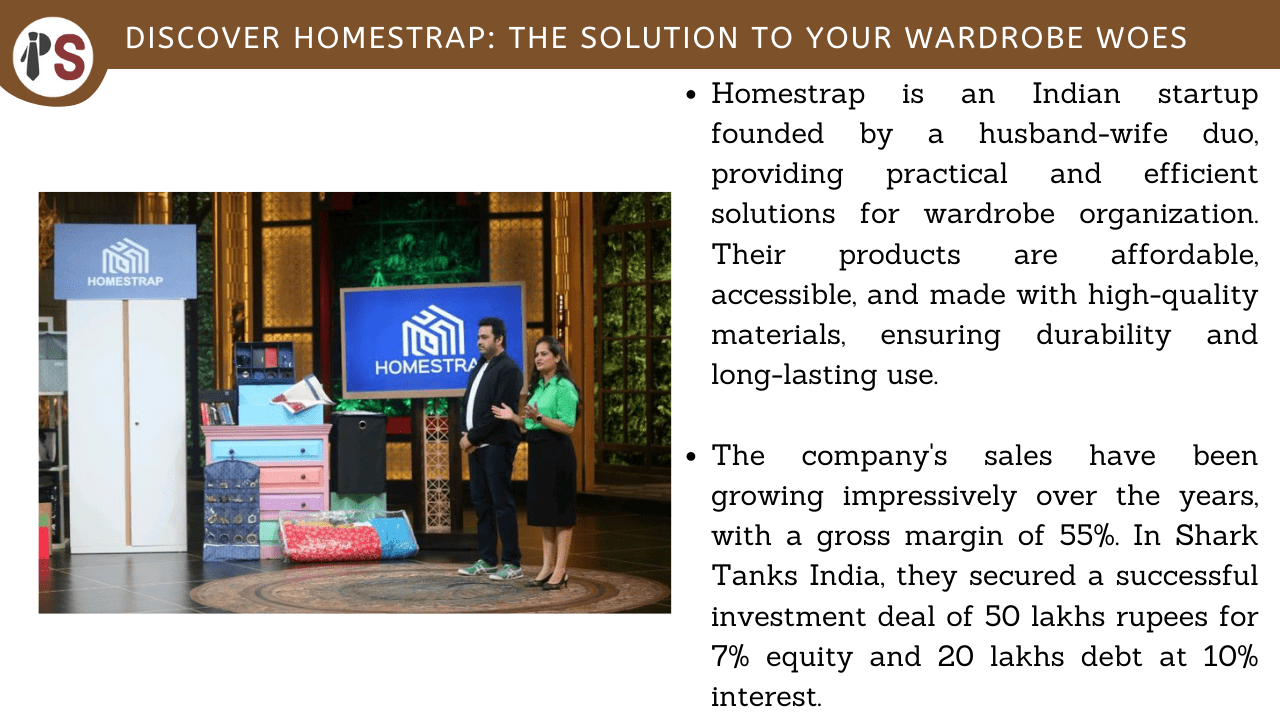
Homestrap is a startup founded by Akash Mehta and Priyanka Mehta, a husband-wife duo from Indore. The idea for the company came to them when they were facing challenges in organizing their own household after the birth of their first child. They realized that this was a common problem faced by many households, and thus, Homestrap was born.
Homestrap is a brand that specializes in organizing wardrobes. Their products include saree organizers, shirt stackers, clothes organizers, jewellery organizers, shoe organizers, and more. The products are designed to keep wardrobes clutter-free and easy to access.
The aim of Homestrap is to help people keep their wardrobes organized and clutter-free. The founders of the startup, Akash Mehta and Priyanka Mehta, recognized that organizing wardrobes is a challenge faced by many households, and they wanted to provide a practical solution to this problem.
By creating innovative products like saree organizers, shirt stackers, clothes organizers, jewellery organizers, and shoe organizers, Homestrap aims to make wardrobe organization easy and accessible for everyone. Their products are designed to help people save time and effort while getting ready in the morning, as well as making it easy to find what they need quickly and efficiently.
Additionally, Homestrap's products are made with quality materials, which ensures durability and long-lasting use. The aim is not just to provide a solution to the immediate problem of wardrobe organization, but to provide a lasting solution that customers can rely on for years to come.
Homestrap's business model revolves around creating innovative products that help people organize their wardrobes. The company's products are sold through e-commerce marketplaces like Flipkart and Amazon, as well as through their own website. Homestrap's target market includes people who value practical and efficient solutions to everyday problems, such as busy professionals, homemakers, and families.
The company's products are affordable and accessible to a wide range of customers, with an average selling price of 505 rupees. Homestrap's business model also includes a focus on quality and customer satisfaction. They ensure that their products are made with high-quality materials, which ensures durability and long-lasting use.
Homestrap's target market includes people who are looking for practical solutions to organize their homes and lives, and who value innovation and quality. Their products are particularly useful for those who have limited storage space or who want to optimize their wardrobes for easy access and use.
Homestrap's business model and target market align well with the growing demand for practical and efficient home organizing solutions in India. The company's focus on quality and innovation is expected to help them capture a significant share of the market and establish themselves as a leading player in the home organizing industry.
Homestrap has experienced a significant increase in sales over the years. In the financial year 16-17, the sales were 2.13 crore rupees, which increased to 7 crore rupees in the financial year 17-18. In the financial year 18-19, the sales further increased to 9 crore rupees, and in the financial year 19-20, the sales were 12 crore rupees. The sales continued to increase in the financial year 20-21 to 19 crore rupees and in the financial year 21-22, the sales were 19.2 crore rupees.
For the last financial year, Homestrap's sales were 17 crore rupees, and for this year, the projected sales are 22 crore rupees. The company's EBITDA is 3%, which indicates that the company has managed its operating expenses efficiently to generate profit.
Homestrap's gross margin is 55%, and the cost of goods sold and GST accounts for 45% of the sales. Among the gross margin, 31% is commission and weight handling, 7% is market handling, 8% is rental and salaries, 6% is other expenses, and 3% is their net profit. This suggests that the company is managing its expenses efficiently to maintain profitability and increase its revenue.
The founders asked for 70 lakhs rupees for 1% equity in their company. After some negotiation, Anupam offered 50 lakhs rupees for 10% equity and 20 lakhs debt at 10% interest. The pitcher countered by offering 50 lakhs for 5% equity and 20 lakhs debt at 10% interest. Anupam then countered by offering 70 lakhs for 10% equity, removing the debt. The pitcher countered again by offering 70 lakhs for 6% equity. Anupam then offered 50 lakhs in exchange for 8% equity and 20 lakhs rupees debt at 10% interest. The pitcher countered by offering 50 lakhs for 7% equity and the debt structure remaining the same.
The final deal was ultimately agreed upon, with Anupam investing 50 lakhs rupees in exchange for 7% equity in Homestrap and 20 lakhs debt at 10% interest. This investment will provide Homestrap with the necessary funds to continue growing their business and increasing their sales revenue.
At Professional Saathi, we offer a range of business consultancy services that help businesses improve their performance, achieve growth, and overcome challenges.
Copyright 2026 © Created By KTPG PROFESSIONAL SAATHI CORPORATE CONSULTANT PRIVATE LIMITED, All Rights Reserved.
Leave Your Comment